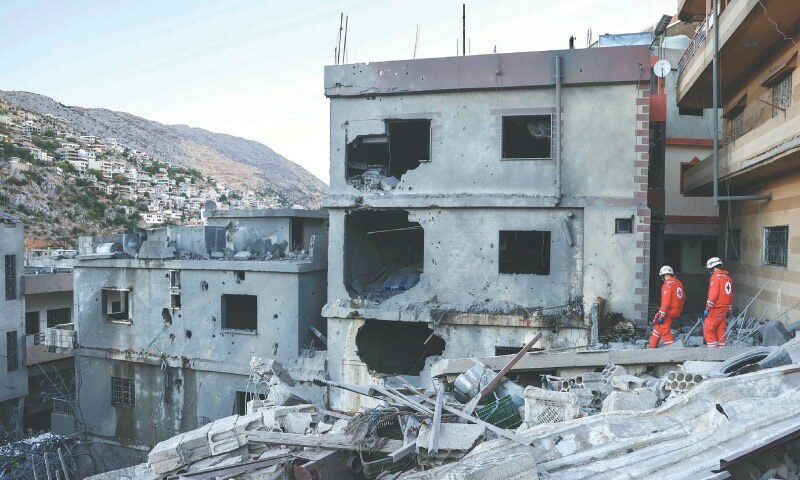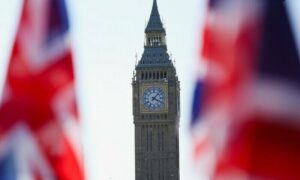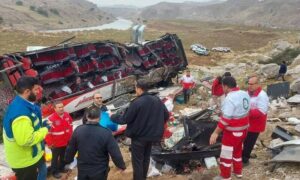• Head of Hezbollah’s drone unit, five Syrian troops killed
• Israeli air strikes spark exodus of 118,000 people
• Lebanon facing its deadliest period in years, UN warns
TEL AVIV: As Israel and Hezbollah traded fire after the United States and its allies failed to secure a halt, an Israeli official said on Friday that any ground operation against Hezbollah would be swift.
While Israeli air strikes have left more than 700 people dead in Lebanon this week, a fresh attack killed five Syrian soldiers near the border with Lebanon on Friday, the official news agency SANA reported.
The comments about swift ground offensive come after top Israeli ministers rejected a truce plan proposed by Israel’s key backer the United States and its allies, seeking to prevent all-out war.
The Israeli official, briefing journalists on condition of anonymity, said forces were “preparing… every day” for a potential ground invasion.
“We will try to do it as short as we can,” said the official, adding that the goal of is to downgrade Hezbollah’s capacity to fire on Israel, eliminate the group’s leadership and “clean” the border areas from fighters.
Since Monday, warplanes have bombarded what Israel called Hezbollah’s strongholds in Lebanon, sparking an exodus of about 118,000 people, according to UN figures. The UN decried the escalation in Israeli attacks in Lebanon as “catastrophic”, warning the country was facing its deadliest period in years.
“The recent escalations in Lebanon are nothing short of catastrophic,” said Imran Riza, the United Nations humanitarian coordinator in Lebanon. “We are witnessing the deadliest period in Lebanon in a generation, and many express their fear that this is just the beginning,” he warned.
Lebanon’s health ministry said hundreds of people, mostly civilians, have been killed in Israeli strikes this week.
Family of nine killed in strike
On Friday, Lebanon’s National News Agency said Israeli air strikes had intensified overnight, and that one strike had killed a family of nine in south Lebanon.
Hours later, Hezbollah fired rockets into the north Israeli city of Tiberias, in response to the strikes on Lebanese towns and villages.
While more than 1,500 people have been killed in Lebanon in nearly a year, over 700 of them have been killed this week alone.
“Everything is collapsing around us,” said Lebanese businessman Anis Rubeiz, 55. “People are tired mentally… I don’t see (hope) on the horizon… or even a ray of light.”
The exchanges of fire came after the United States, France and other allies unveiled a truce proposal, following a meeting of President Joe Biden with his French counterpart, Emmanuel Macron, on the sidelines of UN General Assembly in New York.
But Israeli Foreign Minister Israel Katz rejected the push, vowing to keep fighting Hezbollah “until victory”.
The White House expressed frustration at the rejection, saying the truce proposal had taken “a lot of care and effort”.
On Friday, Secretary of State Antony Blinken told a news conference in New York that the US believed a diplomatic solution was still possible in the Middle East. “The path to diplomacy may seem difficult to see at this moment, but it is there, and in our judgement, it is necessary. We will continue to work intensely,” he said.
However, Blinken also said the US would take “every measure” if its interests were attacked in rising violence. To “anyone using this to target American personnel, American interests in the region, the United States will take every measure,” he claimed.
Also, Macron said it was “a mistake” for Israeli Prime Minister Benjamin Netanyahu to refuse a ceasefire.
For the fourth time in a week, Israel carried out a strike on Beirut, claiming to have killed Hezbollah’s drone unit head.
Diplomats have said that efforts to end Israeli aggression in Gaza were key to halting fighting in Lebanon and bringing the region back from the brink of all-out war. But despite months of mediation efforts, a Gaza ceasefire remains elusive.
Killings in Syria
“The Israeli enemy carried out an aerial attack… on one of our military positions near Kfar Yabus on the Syrian-Lebanese border,” SANA quoted a source as saying, adding that five Syrian soldiers were killed and one was wounded.
The raid came a day after the Israeli army said its warplanes struck “infrastructure along the Syria-Lebanon border used by Hezbollah to transfer weapons from Syria to Hezbollah in Lebanon”.
The Syrian Observatory for Human Rights, a Britain-based war monitor, said Israeli warplanes targeted a crossing that links Syria’s Qusayr area to Lebanon, causing “a number of wounded”. The monitor said it was the first such strike on Syria since Monday when Israel intensified its attacks on Lebanon.
Published in Dawn, September 28th, 2024







